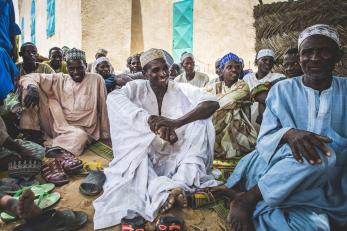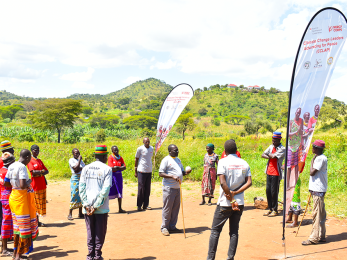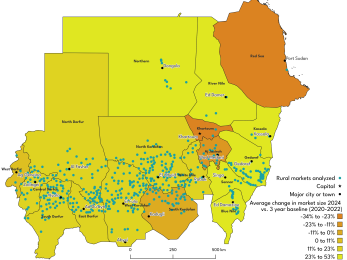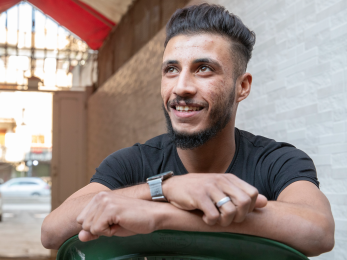Thought Leadership on Peace and Conflict

22 June 2021 • UPDATED 20 January 2022
Last updated January 18, 2022
To seek a deeper understanding of both the underlying causes of violent conflict and what works to prevent, manage, and reduce participation in it, Mercy Corps has produced a series of studies in countries where we work. Building off one another, these studies focus on how we can advance our and others’ approaches to reducing violence while supporting long-term peace and development.
Our Studies
- Research from Somalia, Examining the Links between Youth Economic Opportunity, Civic Engagement, and Conflict (2012), did not find a link between employment status and youth’s attitudes toward violence. Data from an education and civic engagement programme showed that youth who were civically engaged were more likely to have engaged in political violence, indicating that motivated youth may see violence as one of their only options to make change. Through impact evaluations of the same programme, Critical Choices (2016) and If Youth are Given the Chance (2018) we saw that the combination of education and civic engagement – largely community service – led to a decrease in support for and engagement in political violence.
- Our study Does Youth Employment Build Stability? (2014) used an impact evaluation of an employment programme in Afghanistan designed to promote stability. The evaluation found that employment outcomes did not have any impact on stability outcomes. In other words, youth with a job were no less likely to support the Taliban than jobless youth.
- Youth and Consequences (2015) built off these findings in important ways. Through qualitative research with current and former members of armed groups in Afghanistan, Colombia, and Somalia, we found that violence makes people poor, but poverty doesn’t appear to make them violent. Instead, injustice – and the anger resulting from it – was a primary driver of violence.
- From Jordan to Jihad (2015) looked at the motivations of foreign fighters and found that the most common justification for joining the war in Syria was to protect Sunni women and children.
- We explored both what drives youth to join but also resist Boko Haram in Northeast Nigeria in our paper Motivations and Empty Promises (2016), finding that discontent with government and deep inequality contributed to participation in the group. Our follow-up study Gifts and Graft (2016) found that Boko Haram’s financial support increased recruitment and capitalised on frustrations over inadequacies in government economic programmes.
- Our research Investing in Iraq’s Peace (2016) looked at broader dynamics affecting support for armed groups and reinforced the importance of good governance in reducing violent extremism.
- Further research on the drivers of youth participation in violence, We Hope and We Fight (2017), drew on interviews with youth members of armed groups in Mali. We found that community-level factors were the most influential in youths’ decision-making, with youth joining to protect their communities or address perceived government neglect or injustice.
- Through a randomised controlled trial (RCT) in Afghanistan, we tested the impact of economic interventions on political violence. Can Economic Interventions Reduce Violence? (2018) found that a combination of vocational training and cash transfers resulted in a large reduction in willingness to engage in pro-armed opposition group actions six to nine months post-intervention. Neither intervention on its own had a long-term effect.
- Another RCT, Does Peacebuilding Work in the Midst of Conflict? (2019) found that dispute resolution and joint community projects significantly increased contact and trust between farmer and pastoralist communities in Nigeria compared to control sites, even as regional tensions increased. Perceptions of security also increased significantly more in intervention sites. These results verified the findings of an impact evaluation of similar interventions in Nigeria, Reducing Conflict and Increasing Local Economic Activities (2017), in which intervention sites showed significant improvements in reported tensions, inter-group trust, and freedom of movement.
- We used an impact evaluation to show that conflict management and joint community projects also had a strong, positive impact on social cohesion between Syrian refugee and host communities in Jordan, as reported in What Works and What's Next for Social Stability in Jordan? (2019). In the same context, we showed in Advancing Adolescents (2016) that psychosocial support and trauma-healing can both help people feel safer in their community and improve social trust between groups.
- To examine whether improving social cohesion has the potential to reduce vulnerability to violent extremism, Understanding the Links Between Social Cohesion and Violence (2021) analyzed survey data from a P/CVE programme in Niger. The study found that only some dimensions of social cohesion – namely trust and positive intergroup interaction – were associated with a reduced propensity towards violence. These relationships were verified in an RCT of an economic recovery project in Iraq, as reported in A Million Dinar Question (2021). The RCT found that cash transfers combined with financial literacy that brought displaced and host communities together both improved intergroup cohesion and reduced people’s acceptance of violence against other communities.
- While A Million Dinar Question examined cohesion between displaced and host populations, Towards Durable Solutions to Displacement (2021) investigated the drivers of social acceptance of displaced people attempting to return to their home areas in post-ISIS Iraq. Using a series of survey experiments, we showed that returnees’ movement patterns during ISIS rule shaped their social acceptance more than their ethno-religious identity, and that a sense of shared victimhood under ISIS made people, especially men, more likely to accept out-group returnees. Our findings highlighted important gender differences in social acceptance, while providing further evidence that – even in a highly polarised environment – it is possible to improve the prospects of social reintegration and peaceful coexistence through trauma-informed peacebuilding.
- In Fear of the Unknown (2021), we examined the role of religion and identity in driving intercommunal violence in northern Nigeria. We found that violence is largely driven not by religious belief or animus, but by insecurity and a lack of trust between ethno-religious groups. Religious leaders play an important role in both stoking violence – by politicising or enhancing the salience of religious identity – and preventing it by resolving disputes and promoting peace. These findings echo the results of an Inter-Religious Peacebuilding in Northern Nigeria (2017) research report, which found that religious leaders have a high potential to positively influence long-term peacebuilding.


